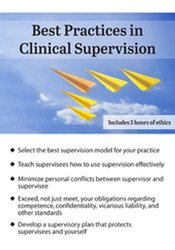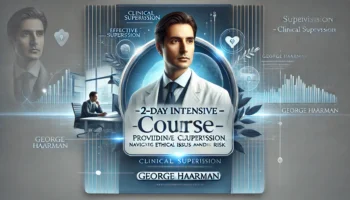Best Practices in Clinical Supervision -A Blueprint for Providing Effective and Ethical Clinical Supervision – George Haarman
Best Practices in Clinical Supervision -A Blueprint for Providing Effective and Ethical Clinical Supervision – George Haarman has the same quality as the author’s salapage.
Overview
Discover the Best Learning with Best Practices in Clinical Supervision -A Blueprint for Providing Effective and Ethical Clinical Supervision – George Haarman
WisMentor is your ultimate destination for online learning. Explore "Best Practices in Clinical Supervision -A Blueprint for Providing Effective and Ethical Clinical Supervision – George Haarman" by top authors and instructors, designed to transform your skills and career. Start now and unlock your potential!
Salepage check: Best Practices in Clinical Supervision -A Blueprint for Providing Effective and Ethical Clinical Supervision
Author: George Haarman
- Faculty:
- George Haarman
- Duration:
- 5 Hours 50 Minutes
- Format:
- Audio and Video
- Copyright:
- Jan 25, 2018
Description
Are you considering joining the ranks of those who are approved to provide this invaluable oversight of fellow professionals? Are you already a clinical supervisor and need to formalize and enhance your knowledge and skills? This recording presents a blueprint, based on established best practices, for providing effective and ethical clinical supervision.
Explore clinical supervision through the lens of critical legal, ethical, and risk management issues. Gain clarity on how to define the goals of supervision, as well as the responsibilities of both supervisor and supervisee. Analyze the “How Do I?” of clinical supervision, with details on individual vs. group supervision, case consultation, interactive live supervision, audio and video sessions, and other methods and techniques. Determine how to meet, and then exceed, your obligations regarding competence, confidentiality, vicarious liability, and other standards.
Handouts
| Manual – Best Practices in Clinical Supervision (1.48 MB) | 76 Pages | Available after Purchase |
Outline
ESTABLISH ROLES AND RESPONSIBILITIES
- Administrative vs. clinical supervision
- Role of the clinical supervisor
- Teaching supervisees how to use supervision effectively
- Assisting supervisees in taking an active role
CHOOSE THE MOST EFFECTIVE SUPERVISION MODEL FOR YOUR SETTING
- Developmental models
- Psychotherapy based models
- Integrative models
- Parallel process model
- The supervisee as “patient”
MASTER EFFECTIVE METHODS AND TECHNIQUES OF SUPERVISION
- Multicultural supervision
- Individual vs. group supervision
- Co-therapy vs. co-responsibility
- Case consultation
- Written activities and case notes
- Live observation
- Interactive live supervision
- Audio and video recording of sessions
- Experiential methods
AVOID AND RESOLVE PROBLEMS THAT ARISE DURING SUPERVISION
- Ethical
- Supervisor competence
- Informed consent
- Boundary issues
- Dual relationships
- Supervisor/supervisee obligations
- Incompetent or impaired supervisees
- Sexual attraction
- Confidentiality
- Documentation
- Evaluation and feedback
- Legal
- Vicarious liability
- Standard-of-care
- Negligence
- Confidentiality vs. privilege
- Duty to warn/report
- Due process
- Risk management
- Knowledge of ethical codes and mental health law
- Supervision contracts
- Boundaries of competence
- Consultation supervision
- Documentation
- Ongoing training in supervision
- Liability insurance coverage
- Insuring confidentiality
- Supervisory malpractice
PROPERLY EVALUATE SUPERVISEES AND SUPERVISION
- Formative vs. summative evaluations
- Criteria for evaluation
- Standardization of methods
- Self-evaluation
- Objective evaluation tools
- Supervisory evaluation
- 360-degree feedback
- Develop a supervisory plan
CASE STUDIES
Faculty
George Haarman, PsyD, LMFT
George B. Haarman, PsyD, LMFT, is a Licensed Clinical Psychologist and a Licensed Marriage and Family Therapist with over 40 years of experience working in a variety of settings, including private practice, youth detention centers, juvenile group homes, child protective services, and juvenile probation. Dr. Haarman completed basic and advanced supervisor training required by the Kentucky Board of Psychology Examiners and maintains approval by the Board to act as a supervisor. In his private practice, he has provided clinical supervision to clinical and counseling practicum students as well as consultation about clinical supervision to psychologists for over 25 years.
Dr. Haarman is a national speaker on clinical supervision, depression, school refusal, ADHD, emotional disorders in children and adults, and the DSM-5®. He is the author of three books: Clinical Supervision: Legal, Ethical, and Risk Management Issues, School Refusal: Children Who Can’t or Won’t Go to School, and Mastering DSM-5®. Dr. Haarman received his doctorate in clinical psychology from Spalding University in 1989. He has been an instructor at Jefferson Community College, Bellarmine University, and Spalding University.
Speaker Disclosures:
Financial: George Haarman is in private practice. He receives a speaking honorarium from PESI, Inc.
Non-financial: George Haarman is a member of the American Psychological Association; and the Kentucky Psychological Association.
About Best Practices in Clinical Supervision -A Blueprint for Providing Effective and Ethical Clinical Supervision – George Haarman and Our Expert Authors
Best Practices in Clinical Supervision -A Blueprint for Providing Effective and Ethical Clinical Supervision – George Haarman is part of our extensive collection of over 70,000 premium courses at WisMentor. Created by renowned authors and industry leaders, this course is tailored to provide cutting-edge knowledge and actionable insights.
Why Choose WisMentor?
- 🌟 Access courses from world-renowned authors.
- 📚 Wide range of topics to suit your professional and personal growth needs.
- 💼 Lifetime access and flexible learning options.
Key Features of Best Practices in Clinical Supervision -A Blueprint for Providing Effective and Ethical Clinical Supervision – George Haarman:
- ✅ Comprehensive content covering essential topics.
- ✅ Evidence-based methodologies and practical examples.
- ✅ Learn at your own pace with expert guidance.
How to Access Your Course?
Getting started is easy:
- 📩 Receive an instant download link via email.
- 🌐 Access your course anytime through your account dashboard.
- 📱 Compatible with all devices for a seamless experience.
Need Help?
Our dedicated support team is here to assist you. Visit our Contact Us page or reach out via email for any queries or assistance.
More from Our Collection:
Don’t miss the opportunity to explore more courses from top authors and enrich your learning journey at WisMentor. Find your next course now and take your skills to the next level.
Curriculum
Curriculum
- 3 Sections
- 0 Lessons
- 5 Weeks
- Manual - Best Practices in Clinical Supervision (1.48 MB) 76 Pages Available after Purchase0
- PDF Manual - Best Practices in Clinical Supervision - French (1.48 MB) 76 Pages Available after Purchase0
- PDF Manual - Best Practices in Clinical Supervision - Italian (1.48 MB) 76 Pages Available after Purchase0
FAQs
Requirements
- A basic understanding of clinical supervision and its role in healthcare.
- Familiarity with ethical standards and principles in clinical settings.
- Access to a computer or device to watch digital course materials.
- A commitment to improving supervision skills in professional practice.
Features
- Comprehensive Curriculum: Covers core ethical principles, effective supervision techniques, and professional guidelines.
- Practical Case Studies: Analyze real-world scenarios to strengthen decision-making skills.
- Advanced Frameworks: Explore innovative methods for managing complex supervisory challenges.
- Digital Convenience: Access the course materials online anytime, anywhere.
- Cost-Effective Learning: Save up to 80% compared to the original SalePage price.
Target audiences
- Licensed professionals: Clinical supervisors, psychologists, counselors, and therapists.
- Students or trainees: Individuals studying counseling, psychology, or related fields.
- Healthcare administrators: Those managing teams requiring clinical oversight.
- Ethics and compliance professionals: Interested in ethical supervisory frameworks.



